委婉语课文翻译
- 格式:doc
- 大小:30.00 KB
- 文档页数:4
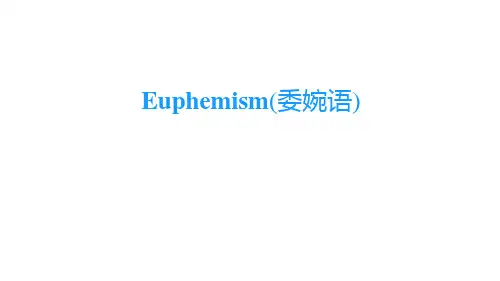
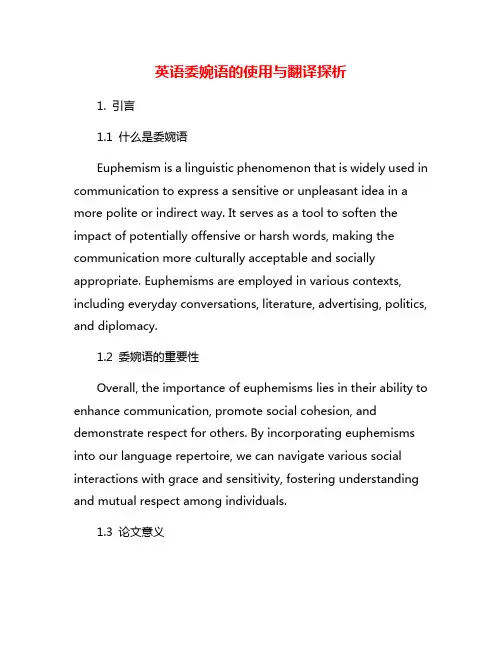
英语委婉语的使用与翻译探析1. 引言1.1 什么是委婉语Euphemism is a linguistic phenomenon that is widely used in communication to express a sensitive or unpleasant idea in a more polite or indirect way. It serves as a tool to soften the impact of potentially offensive or harsh words, making the communication more culturally acceptable and socially appropriate. Euphemisms are employed in various contexts, including everyday conversations, literature, advertising, politics, and diplomacy.1.2 委婉语的重要性Overall, the importance of euphemisms lies in their ability to enhance communication, promote social cohesion, and demonstrate respect for others. By incorporating euphemisms into our language repertoire, we can navigate various social interactions with grace and sensitivity, fostering understanding and mutual respect among individuals.1.3 论文意义The significance of this paper lies in the exploration of the use and translation of English euphemisms. Euphemisms play a crucial role in communication as they allow speakers to convey their message in a more subtle and respectful manner. Understanding the nuances of euphemistic language can help individuals navigate social interactions effectively and avoid causing offense or discomfort.2. 正文2.1 委婉语的定义Euphemism refers to the use of indirect or mild expressions to replace harsh or offensive words or phrases. It is a linguistic phenomenon that serves the purpose of being polite, diplomatic, or tactful in communication. Euphemisms can be found in various aspects of language, including everyday speech, literature, advertising, and professional communication.2.2 委婉语的分类1. 礼貌委婉语:这种委婉语是为了表示尊重和礼貌而使用的,通常用于社交场合或与陌生人交流时。
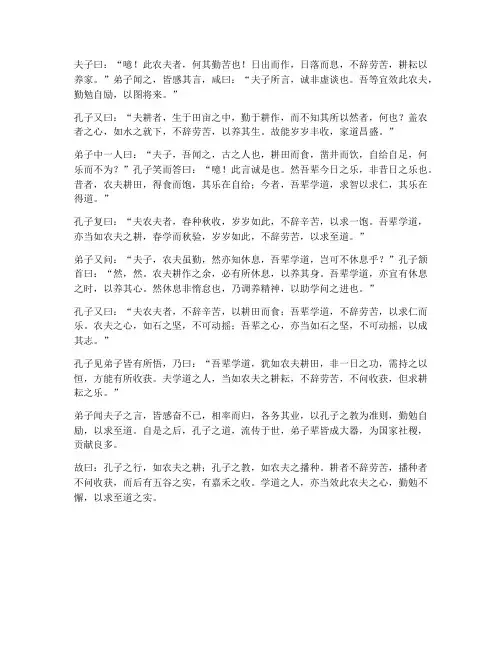
夫子曰:“噫!此农夫者,何其勤苦也!日出而作,日落而息,不辞劳苦,耕耘以养家。
”弟子闻之,皆感其言,咸曰:“夫子所言,诚非虚谈也。
吾等宜效此农夫,勤勉自励,以图将来。
”孔子又曰:“夫耕者,生于田亩之中,勤于耕作,而不知其所以然者,何也?盖农者之心,如水之就下,不辞劳苦,以养其生。
故能岁岁丰收,家道昌盛。
”弟子中一人曰:“夫子,吾闻之,古之人也,耕田而食,凿井而饮,自给自足,何乐而不为?”孔子笑而答曰:“噫!此言诚是也。
然吾辈今日之乐,非昔日之乐也。
昔者,农夫耕田,得食而饱,其乐在自给;今者,吾辈学道,求智以求仁,其乐在得道。
”孔子复曰:“夫农夫者,春种秋收,岁岁如此,不辞辛苦,以求一饱。
吾辈学道,亦当如农夫之耕,春学而秋验,岁岁如此,不辞劳苦,以求至道。
”弟子又问:“夫子,农夫虽勤,然亦知休息,吾辈学道,岂可不休息乎?”孔子颔首曰:“然,然。
农夫耕作之余,必有所休息,以养其身。
吾辈学道,亦宜有休息之时,以养其心。
然休息非惰怠也,乃调养精神,以助学问之进也。
”孔子又曰:“夫农夫者,不辞辛苦,以耕田而食;吾辈学道,不辞劳苦,以求仁而乐。
农夫之心,如石之坚,不可动摇;吾辈之心,亦当如石之坚,不可动摇,以成其志。
”孔子见弟子皆有所悟,乃曰:“吾辈学道,犹如农夫耕田,非一日之功,需持之以恒,方能有所收获。
夫学道之人,当如农夫之耕耘,不辞劳苦,不问收获,但求耕耘之乐。
”弟子闻夫子之言,皆感奋不已,相率而归,各务其业,以孔子之教为准则,勤勉自励,以求至道。
自是之后,孔子之道,流传于世,弟子辈皆成大器,为国家社稷,贡献良多。
故曰:孔子之行,如农夫之耕;孔子之教,如农夫之播种。
耕者不辞劳苦,播种者不问收获,而后有五谷之实,有嘉禾之收。
学道之人,亦当效此农夫之心,勤勉不懈,以求至道之实。

新概念英语第一册课文翻译及学习笔记Lesson107【课文】Assistant: Do you like this dress, madam?Lady: I like the colour very much. It's a lovely dress, but it's too small for me.Assistant: What about this one? It's a lovely dress.It's very smart. Short skirts are in fashion now. Would youlike to try it?Lady: All right.Lady: I'm afraid this green dress is too small for meas well. It's smaller than the blue one.Lady: I don't like the colour either. It doesn't suitme at all. I think the blue dress is prettier.Lady: Could you show me another blue dress? I want a dress like that one, but it must be my size.Assistant: I'm afraid I haven't got a larger dress.This is the largest dress in the shop.【课文翻译】店员:夫人,您喜欢这件衣服吗?女士:我很喜欢这颜色。
这件漂亮的衣服,不过对我来说太小了。
店员:这件怎么样?这是件漂亮的衣服,它很时髦。
短裙现在很流行。
您要试一试吗?女士:好吧。
店员:恐怕这件绿色的我穿着也太小了。
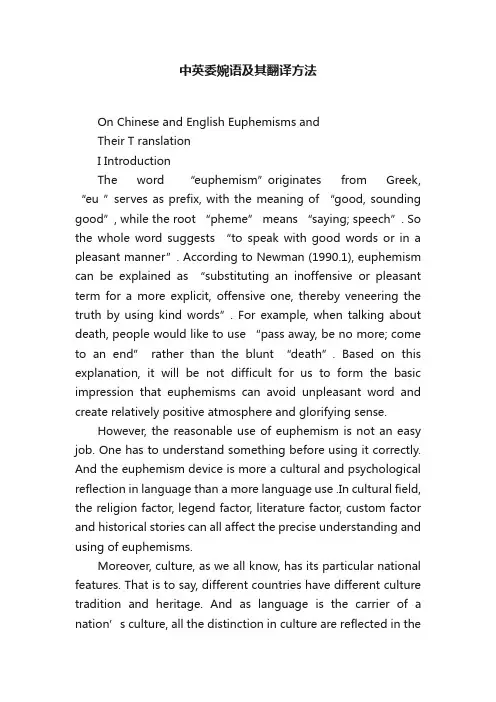
中英委婉语及其翻译方法On Chinese and English Euphemisms andTheir T ranslationI IntroductionThe word “euphemism”originates from Greek, “eu ”serves as prefix, with the meaning of “good, sounding good”, while the root “pheme” means “saying; speech”. So the whole word suggests “to speak with good words or in a pleasant manner”. According to Newman (1990.1), euphemism can be explained as “substituting an inoffensive or pleasant term for a more explicit, offensive one, thereby veneering the truth by using kind words”. For example, when talking about death, people would like to use “pass away, be no more; come to an end” rather than the blunt “death”. Based on this explanation, it will be not difficult for us to form the basic impression that euphemisms can avoid unpleasant word and create relatively positive atmosphere and glorifying sense.However, the reasonable use of euphemism is not an easy job. One has to understand something before using it correctly. And the euphemism device is more a cultural and psychological reflection in language than a more language use .In cultural field, the religion factor, legend factor, literature factor, custom factor and historical stories can all affect the precise understanding and using of euphemisms.Moreover, culture, as we all know, has its particular national features. That is to say, different countries have different culture tradition and heritage. And as language is the carrier of a nation’s culture, all the distinction in culture are reflected in thelanguage level. As the use of it has to be performed under the cultural instruction and consideration.At present, euphemism use, as one of the commonest phenomena in human language, has been deeply embedded in the language use. In the daily life and work, euphemism can lubricate and coordinate the interrelation among person to make the communication go on more smoothly. So it will not be exaggerated to emphasize euphemisms’import ance. Instead, as the improvement of social civilization, more and more euphemisms use will be adopted in language production. What’s more, the chance of communication between Chinese and foreigners is more frequent, during this process, it is quite important to know about the respective communication habits and cultural tradition in order to avoid unnecessary misunderstanding in both sides. So the authorwould like to say, it is of great value and practical instruction in cross-cultural communication to study this interesting language method-euphemism in terms of cultural intention between Chinese and English.II The Same Cultural Psychology of Euphemism Use in Chinese and English LanguageAlthough euphemism have an early origination, they hadn’t begun to appear in a wide range at a swift space until the modern times when the technology and productivity were improving constantly and the whole society and human kind were in a processing state. Just during this processing much taboo in social, psychological and language aspect has turned up constantly, which provided a good precondition for the booming of euphemism. Here, the article will further analyze the commoncultural elements in the use of euphemisms in Chinese and English from three different angles.2.1 Language T abooEither in highly civilized society or in the primitive tribes, there exist euphemisms. Either in widely used languages or in the languages of ethnic groups, there exist euphemisms. The earliest field of their uses is the addresses to the God or the ghost. Because at the early times, people’s knowledge about nature and science is lacking badly, then they had to own many mystic things to the influence of ghost or God. And they were so worshipping and horrified to this kind of super power that they began slowly to avoid mentioning then frankly and directly. Then taboo became the earliest euphemism.For example, in English-speaking countries, they are so devoted to the God that they use many other names for Jehovah, such as the Almighty, the Supreme being, Holy one the Eternal, the Maker, the Savior and the lord of lords and so on. In Chinese there are also many euphemisms due to taboo. Take the expression of death for example, the Chinese euphemisms for it includes:离去,不在了,走了,仙逝,骑鹤,涅磐,去西天,蝉蜕,崩,弃世,不戮,and so on.Of course there are many other fields where taboo is actively stimulating the use of various euphemisms. Generally speaking, both in Chinese and English, euphemisms in disease, sex, excretion, unemployment, poverty and old age are the most usual occasions to see them. Any language user should pay careful attention to the taboo culture, both home and abroad, either same or different or else, others may be badly offended while you still feel quite innocent. So it is better for language users to avoidunhappiness and go on more joyful conversation.2.2The Common Aesthetical ConceptAesthetical concept is a potential consciousness university owed by all the person in the society. Culturally speaking, it is cultivated gradually together with cult ure in people’s mind and in the wide environment of the whole society. So as long as one exists as a person in a social context, literate or illiterate, he is sure to hold some kind of most preliminary cultural concept in aesthetics.Due to communal aesthetics in the whole word, any kind of languages, Chinese or English, there must be similar euphemisms in such fields as birth, death, disease, sex, crime, professions, politics and so on. Especially on public occasions, words in terms of those fields are usually avoided to express in a frankly speaking way but in a veneering and encoring way, in order to lessen unpleasant factors and add joyful elements. Therefore, graceful and mild terms often appear in this content. Let’s read the following two groups of sentences.(a)He got venereal disease.他得过性病。
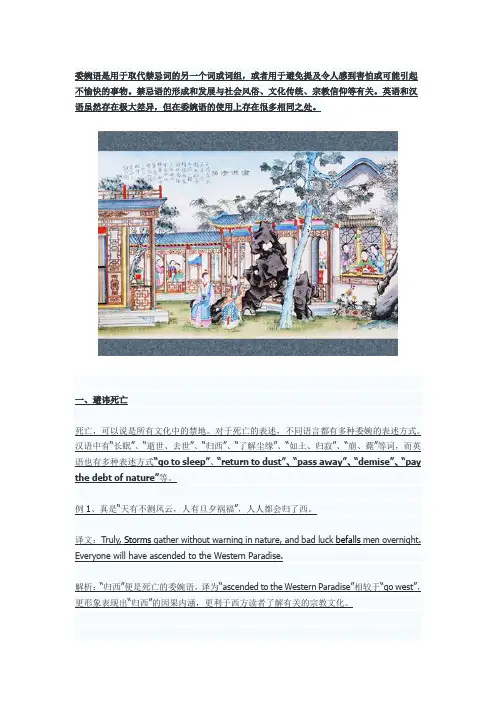
一、避讳死亡死亡,可以说是所有文化中的禁地。
对于死亡的表述,不同语言都有多种委婉的表述方式。
汉语中有“长眠”、“逝世、去世”、“归西”、“了解尘缘”、“如土、归寂”、“崩、薨”等词,而英语也有多种表述方式“go to sleep”、“return to dust”、“pass away”、“demise”、“pay the debt of nature”等。
例1、真是“天有不测风云,人有旦夕祸福”,人人都会归了西。
译文:Truly, Storms gather without warning in nature, and bad luck befalls men overnight. Everyone will have ascended to the Western Paradise.解析:“归西”便是死亡的委婉语,译为“ascended to the Western Paradise”相较于“go west”,更形象表现出“归西”的因果内涵,更利于西方读者了解有关的宗教文化。
例2、凤姐儿听了,眼圈儿红了半天,半日方说道:“...这个年纪,倘或就因这个病上怎么样了,人还活着有什么趣儿!”译文:Xi- feng’ s eyes became moist. She said at last, “ but she’s only a child still. If anything should happen to her as a result of this illne ss, I think all the fun would go out of life!”解析:凤姐与秦氏关系要好,面对好友重病,凤姐自然对“死”讳莫如深,文中的“怎么样了”,便是死亡的委婉语。
译者采用“If anything should happen”这样模糊的表达,再现了原文的意图,也突显了凤姐对秦氏的不忍和怜惜之情。
例3、几时我闭了这眼,断了这口气....译1:Once I’ve closed my eyes and breathed my last.译2:I’ ll be glad when I’ ve drawn my last breath and closed my old eyes for the last time.解析:原文“闭了眼”、“断了气”都是死亡的委婉语。
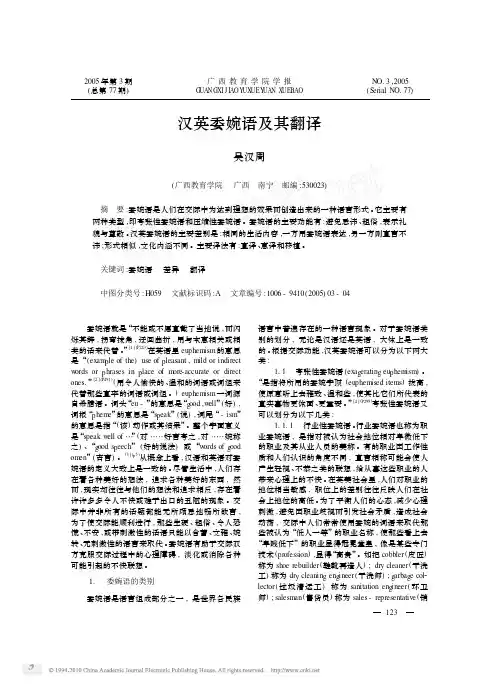
—123—汉英委婉语及其翻译吴汉周(广西教育学院广西南宁邮编:530023)摘要:委婉语是人们在交际中为达到理想的效果而创造出来的一种语言形式。
它主要有两种类型,即夸张性委婉语和压缩性委婉语。
委婉语的主要功能有:避免忌讳、粗俗,表示礼貌与尊敬。
汉英委婉语的主要差别是:相同的生活内容,一方用委婉语表达,另一方则直言不讳;形式相似,文化内涵不同。
主要译法有:直译、意译和移植。
关键词:委婉语差异翻译中图分类号:H059文献标识码:A文章编号:1006-9410(2005)03-04委婉语就是“不能或不愿直截了当地说,而闪烁其辞,拐弯抹角,迂回曲折,用与本意相关或相类的话来代替。
”[1](P243)在英语里eu p hem ism 的意思是“(exam p le of the )use of p leasant ,m ild or indirectw ords or p hrases in p lace of m ore-accurate or directones 1”[2](P491)(用令人愉快的、温和的词语或词组来代替那些直率的词语或词组。
)eu p hem ism 一词源自希腊语。
词头“eu -”的意思是“g ood ,w ell ”(好),词根“p hem e ”的意思是“s p eak ”(说),词尾“-ism ”的意思是指“(该)动作或其结果”。
整个字面意义是“s p eak w ell of …”(对……好言夸之,对……婉称之)、“g ood s p eech ”(好的说法)或“w ords of g oodom en ”(吉言)。
[3](p 5)从概念上看,汉语和英语对委婉语的定义大致上是一致的。
尽管生活中,人们存在着各种美好的想法,追求各种美好的东西,然而,现实却往往与他们的想法和追求相反,存在着许许多多令人不快或难于出口的丑陋的现象。
交际中并非所有的话题都能无所顾忌地畅所欲言,为了使交际能顺利进行,那些生硬、粗俗、令人恐慌、不安,或带刺激性的话语只能以含蓄、文雅、婉转、无刺激性的语言来取代。
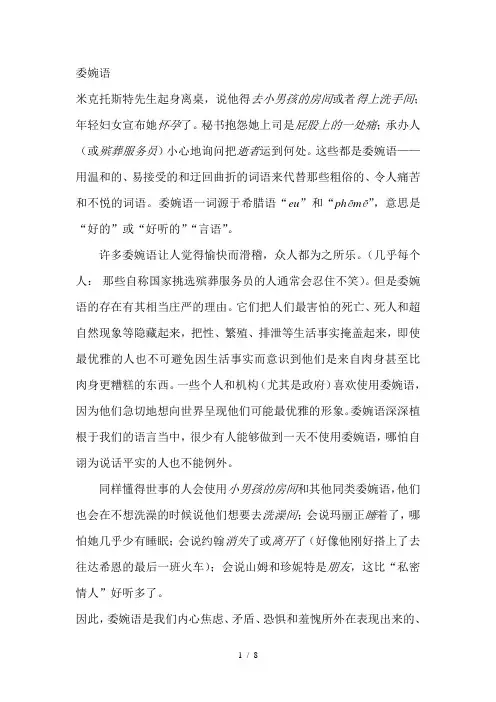
委婉语米克托斯特先生起身离桌,说他得去小男孩的房间或者得上洗手间;年轻妇女宣布她怀孕了。
秘书抱怨她上司是屁股上的一处痛;承办人(或殡葬服务员)小心地询问把逝者运到何处。
这些都是委婉语——用温和的、易接受的和迂回曲折的词语来代替那些粗俗的、令人痛苦和不悦的词语。
委婉语一词源于希腊语“eu”和“phēmē”,意思是“好的”或“好听的”“言语”。
许多委婉语让人觉得愉快而滑稽,众人都为之所乐。
(几乎每个人:那些自称国家挑选殡葬服务员的人通常会忍住不笑)。
但是委婉语的存在有其相当庄严的理由。
它们把人们最害怕的死亡、死人和超自然现象等隐藏起来,把性、繁殖、排泄等生活事实掩盖起来,即使最优雅的人也不可避免因生活事实而意识到他们是来自肉身甚至比肉身更糟糕的东西。
一些个人和机构(尤其是政府)喜欢使用委婉语,因为他们急切地想向世界呈现他们可能最优雅的形象。
委婉语深深植根于我们的语言当中,很少有人能够做到一天不使用委婉语,哪怕自诩为说话平实的人也不能例外。
同样懂得世事的人会使用小男孩的房间和其他同类委婉语,他们也会在不想洗澡的时候说他们想要去洗澡间;会说玛丽正睡着了,哪怕她几乎少有睡眠;会说约翰消失了或离开了(好像他刚好搭上了去往达希恩的最后一班火车);会说山姆和珍妮特是朋友,这比“私密情人”好听多了。
因此,委婉语是我们内心焦虑、矛盾、恐惧和羞愧所外在表现出来的、看得见的声音。
它们像是放射性同位素,追踪他们就有可能发现我们语言、头脑和文化当中已经发生过和正在发生的事情。
委婉语可分为两种大概类型——肯定式和否定式。
肯定式委婉语的作用是膨胀和放大,使得委婉的内容显得比实际更为宏大和重要。
否定式委婉语的作用是收缩和消减。
它们具有防卫天性,能够抵消禁忌用语的力量并且消除语言中人们不愿直接面对的一切东西。
肯定式委婉语包括许多花哨的职业名称,通过提高工人的工作地位来安慰他们的自尊心:比如把守门人叫做看管人(守门人本身也是看护人的委婉语),用顾问代替律师和各种类型的工程师(灭火工程师、床垫工程师、公关工程师等等),用帮助代替雇工(原本是奴隶的委婉语),用垂钓女和坐台女代替妓女等等。
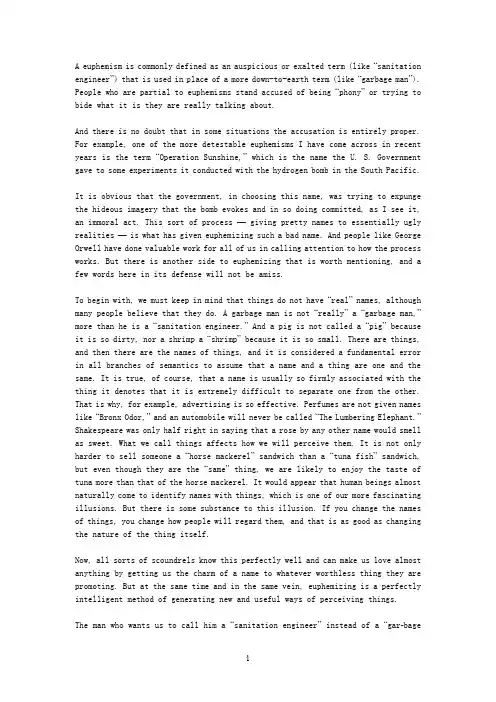
A euphemism is commonly defined as an auspicious or exalted term (like “sanitation engineer”) that is used in place of a more down-to-earth term (like “garbage man”). People who are partial to euphemisms stand accused of being “phony” or trying to bide what it is they are really talking about.And there is no doubt that in some situations the accusation is entirely proper. For example, one of the more detestable euphemisms I have come across in recent years is the term “Operation Sunshine,” which is the name the U. S. Government gave to some experiments it conducted with the hydrogen bomb in the South Pacific.It is obvious that the government, in choosing this name, was trying to expunge the hideous imagery that the bomb evokes and in so doing committed, as I see it, an immoral act. This sort of process — giving pretty names to essentially ugly realities — is what has given euphemizing such a bad name. And people like George Orwell have done valuable work for all of us in calling attention to how the process works. But there is another side to euphemizing that is worth mentioning, and a few words here in its defense will not be amiss.To begin with, we must keep in mind that things do not have “real” names, although many people believe that they do. A garbage man is not “really” a “garbage man,”more than he is a “sanitation engineer.” And a pig is not called a “pig” because it is so dirty, nor a shrimp a “shrimp” because it is so small. There are things, and then there are the names of things, and it is considered a fundamental error in all branches of semantics to assume that a name and a thing are one and the same. It is true, of course, that a name is usually so firmly associated with the thing it denotes that it is extremely difficult to separate one from the other. That is why, for example, advertising is so effective. Perfumes are not given names like “Bronx Odor,”and an automobile will never be called “The Lumbering Elephant.”Shakespeare was only half right in saying that a rose by any other name would smell as sweet. What we call things affects how we will perceive them. It is not only harder to sell someone a “horse mackerel” sandwich than a “tuna fish” sandwich, but even though they are the “same” thing, we are likely to enjoy the taste of tuna more than that of the horse mackerel. It would appear that human beings almost naturally come to identify names with things, which is one of our more fascinating illusions. But there is some substance to this illusion. If you change the names of things, you change how people will regard them, and that is as good as changing the nature of the thing itself.Now, all sorts of scoundrels know this perfectly well and can make us love almost anything by getting us the charm of a name to whatever worthless thing they are promoting. But at the same time and in the same vein, euphemizing is a perfectly intelligent method of generating new and useful ways of perceiving things.The man who wants us to call him a “sanitation engineer” instead of a “gar-bageman” is hoping we will treat him with more respect than we presently do. He wants us to see that he is of some importance to our society. His euphemism is laughable only if we think that he is not deserving of such notice or respect. The teacher who prefers us to use the term “culturally different children” instead of “slum children”is euphemizing, all right, but is doing it to encourage us to see aspects of a situation that might otherwise not be attended to. The point I am making is that there is nothing in the process of euphemizing itself that is contemptible. Euphemizing is contemptible when a name makes us see something that is not true or diverts our attention from something that is. The hydrogen bomb kills. There is nothing else that it does. And when you experiment with it, you are trying to find out how widely and well it kills. Therefore, to call such an experiment “Operation Sunshine” is to suggest a purpose for the bomb that simply does not exist. But to call “slum children”“culturally different”‘is something else. It calls attention, for example, to legitimate reasons why such children might feel alienated from what goes on in school.I grant that sometimes such euphemizing does not have the intended effect. It is possible for a teacher to use the term “culturally different”but still be controlled by the term “slum children” (which the teacher may believe is their “real” name). “Old people”may be called “senior citizens,”and nothing might change. And “lunatic asylums” may still be filthy, primitive prisons though they are called “mental institutions.”Nonetheless, euphemizing may be regarded as one of our more important intellectual resources for creating new perspectives on a subject.The attempt to rename “old people”“senior citizens” was obviously motivated by a desire to give them a political identity; which they not only warrant but which may yet have important consequences。

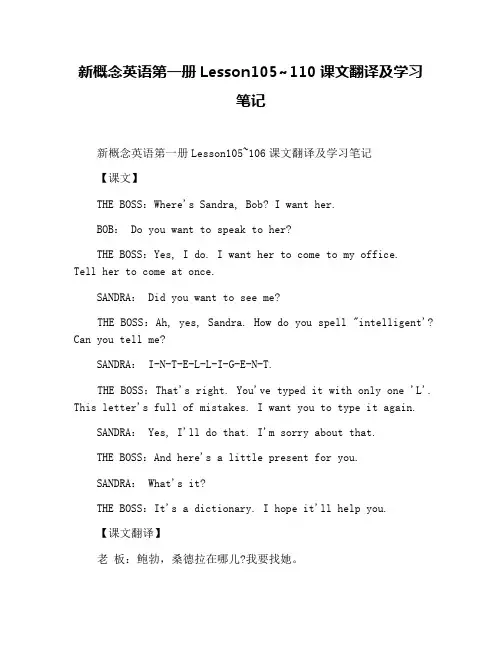
新概念英语第一册Lesson105~110课文翻译及学习笔记新概念英语第一册Lesson105~106课文翻译及学习笔记【课文】THE BOSS:Where's Sandra, Bob? I want her.BOB: Do you want to speak to her?THE BOSS:Yes, I do. I want her to come to my office.Tell her to come at once.SANDRA: Did you want to see me?THE BOSS:Ah, yes, Sandra. How do you spell "intelligent'? Can you tell me?SANDRA: I-N-T-E-L-L-I-G-E-N-T.THE BOSS:That's right. You've typed it with only one 'L'. This letter's full of mistakes. I want you to type it again.SANDRA: Yes, I'll do that. I'm sorry about that.THE BOSS:And here's a little present for you.SANDRA: What's it?THE BOSS:It's a dictionary. I hope it'll help you.【课文翻译】老板:鲍勃,桑德拉在哪儿?我要找她。
鲍勃:您要同她谈话吗?老板:是的,我要她到我的办公室来。
叫她马上就来。
桑德拉:您找我吗?老板:啊,是的,桑德拉。
"intelligent" 怎样拼写?你能告诉我吗?桑德拉:I-N-T-E-L-L-I-G-E-N-T。
英汉委婉语对比与翻译1.英文委婉语: He is not exactly the right person for the job.翻译成中文:他不是恰当的人选。
中文委婉语:他可能并不是我们寻找的最佳人选。
2.英文委婉语: I'm afraid I must decline your invitation.翻译成中文:我恐怕必须拒绝您的邀请。
中文委婉语:恕我直言,这次我可能不能赴约。
3.英文委婉语: Can we delay the meeting for a few days?翻译成中文:我们能把会议延后几天吗?中文委婉语:能否麻烦您把这个会议的时间往后推迟一下?4.英文委婉语: The dress isn't quite my style.翻译成中文:这件衣服不太适合我。
中文委婉语:我觉得这条裙子款式可能有点不太适合我。
5.英文委婉语: I don't think it's a good idea.翻译成中文:我认为这不是个好主意。
中文委婉语:可能我们需要好好的考虑一下,这么做是否合适。
6.英文委婉语: It's not exactly what I was hoping for.翻译成中文:这不完全是我所希望的东西。
中文委婉语:可能这个方案还需要再进行一些改进。
7.英文委婉语: I'm sorry, but that's not quite what I had in mind.翻译成中文:对不起,但这不完全是我所想象的。
中文委婉语:我们需要更加详尽地考虑一下,这个方案是否能够得到最佳的效果。
8.英文委婉语: I'm afraid that won't be possible.翻译成中文:恐怕这是不可能的。
中文委婉语:可能我们需要再考虑一下其他的做法。
9.英文委婉语: It's not exactly what I had in mind, butit's close.翻译成中文:不完全是我所想象的,但很接近。
2162019年45期总第485期ENGLISH ON CAMPUS委婉语英汉对比——以《红楼梦》译本中委婉语的翻译为例文/王宝莹现理想交际目的的语言风格。
委婉语能够将人类的文明提升到更高的水平。
现实中的委婉语多种多样,无穷无尽。
二、《红楼梦》中关于“死亡”的文化负载词翻译人们普遍承认《红楼梦》是中国古典小说所达到的最高成就,特别是在传统文化方面。
在文化研究的过程中,起着至关重要作用的就是文化负载词。
它是国家或民族文化所特有的,并且伴随着经济和文化的高速发展,对文化负载词的翻译越来越受到人们的重视。
许多学者认为文化负载词可以用来表达中国传统文化,因此,对文化负载词的翻译的研究不仅可以促进中国文化向世界的传播,也可以促进不同国家之间的交流。
“死亡”在许多不同语言和文化中都是禁忌之一。
古人对死亡一无所知,对死亡有着强烈的恐惧,所以他们会在使用语言时尽量避免提及“死亡”这个词。
这一现象与语言拜物教息息相关,在古代,当时的人们对语言和语言所反映的事物之间的关系并不理解,他们认为单词也就等同于它所代表的概念。
所以,他们相信这些话有一定的魔力,一旦一句话被说出来就可能会成为现实。
因此,“死亡”是一个禁忌。
但是死亡是人类全都不可改变的结局,“死亡”这个词在现实中是无法避免的,所以它需要被其他表达代替,于是人们就创造了用来代替死亡的委婉语。
在英汉这两种语言中全都存在着大量用来代替死亡的委婉语。
据统计,英语中代替死亡的委婉语的数量大概为400个,而汉语中则有近500个。
自古以来,无论在东西方,“死亡”这个词总是被人们回避着的。
英国的哲学家弗朗西斯·培根曾经在《死亡》一书中说过:“男人害怕死亡,就像孩子害怕在黑暗中行走一样;并且正如孩子们与生俱来的恐惧会随着听到的恐怖故事而增加,另一个也是如此。
”在追求好运和避免灾难的心理的驱使下,人们通常不习惯也不情愿直接的使用“死亡”这个词,他们通常选择用委婉的方式来代替。
AbstractThe usage of euphemism involved in every aspects of our daily life and social activities which have made it become a absorbing language phenomenon in English spoken world. This essay starts from the definition and origin of euphemism and gives a initial discussion of the categories, functions, regulations and translation methods of English euphemism to enhance the ability of understanding and communication of euphemism when it in practical translation uses.Key words: euphemism; communication; culture; translation摘要委婉语使用的范围涉及社会及个人生活的方方面面,成为英语世界中一个引人注目的语言现象。
本文从委婉语的定义和起源入手,对英语委婉语的分类、功能、规律及其翻译方法做了初步探讨,以期达到在实际翻译工作中加强对委婉语的理解和交流之目的。
关键词:委婉语;文化;交流;翻译I. IntroductionAs a rhetorical device, Euphemism had been widely used during the Victorian period which is a fashion in the upper class at that time. And even nowadays the usage of euphemism has increased and brought some new changes, making people impact their eyes imappearance of sorts. For example, she is pregnant has different expression according to different ages.1.She has canceled all her social engagement.(1856)2.She is in an interesting condition.(1880)3.She is in a delicate condition.(1895)4. She is knitting little bootees.(1990)5.She is in a family way.(1920)Also, the range of the usage of euphemism is constantly widening and involving numerous aspects in our daily life which makes it become an inevitable lingual phenomenon in the English world. However, the comprehensive uses of euphemism in English has brought a big challenge to translator whose mother tongue is not English to understand and express those euphemism. This essay begins with the definition and origin and further discuss the categories, functions, principles and translation method in order to gain a better understanding and communication in practical use of euphemism. Actually, it is not only English spoken countries have the usage of euphemism but also in many other languages. But this essay only put the main part in English spoken countries.II. The Definition and Origination of EuphemismThrough euphemism, we replace, override, and reinvent reality by the magic of language (Stein, 1998, p. 8). Euphemism is about how we humans devise deliberately slippery language to justify to ourself and to others, if not to impose on them, the degradation of categories of people, if not the literal extinction of their lives (Stein, 1998, p. 7). Euphemism is the substitution of a mild, indirect, or vague expressio n for an offensive or unpleasant one (Wilkes, 1979, p. 123). Euphemism is not a footnote but part of the main text of organizational life. It is the key to unlock the well-kept secrets of organizational behavior, of bureaucracies and, of people in communities. It is a figure of intentionality and, concurrently, a distraction from that intentionality (Stein, 1998, p. 4). Euphemism recloaks the bad as being good. Things are not what they seem, but what we need them to seem. Euphemism makes masking into an obscenely fine art. We are commanded to believe uncritically that things are only what they seem (Stein,1998, p. 4). The definition of euphemism in The Encyclopaedia Britian is “Figure of speech in which something of unpleasant, distressing or indelicate natu re is described in less offensive term”. Namely, many things are never openly said but use an vague way to entertain people by avoiding those unpleasant and disrespect expressions. Euphemism stems from emphemismos in Greek and its prefix “Eu”means good and the stem“phemism” means “speech”. So the whole meaning is "good speech". Greeks shown great worship and admiration to natural power and sometimes even felt confused which made them prefer to say some good speeches, euphemism, when they conducted sacrifices. That is the direct reason that euphemism is produced. Later on, the Greek civilization has been spreaded to worldwide, giving a great impact on Europe and America countries. Therefore, euphemism has been widely developed in Europe and America areas. The range of the uses have expand from religious area to many aspects of humans' daily life. Generally speaking, euphemism includes the avoidance of taboos, sensitive words and usage of implications and circuity.错误!未找到引用源。
【导语】新概念英语作为⼀套世界闻名的英语教程,以其全新的教学理念,有趣的课⽂内容和全⾯的技能训练,深受⼴⼤英语学习者的欢迎和喜爱。
为了⽅便同学们的学习,为⼤家整理了⾯的新概念第⼀册课⽂翻译及学习笔记,希望为⼤家的新概念英语学习提供帮助!Lesson103【课⽂】 GARY: How was the exam, Richard? RICHARD: Not too bad. I think I passed inEnglish and Mathematics.The questions were very easy.How about you, Gary? GARY: The English and Maths papers weren't easy enough for me. I hope I haven't failed. RICHARD: I think I failed the French paper.I could answer sixteen of the questions. They were very easy. But I couldn't answer the rest. They were too difficult for me. GARY: French test are awful, aren't they? RICHARD: I hate them. I'm sure I've got a low mark. GARY: Oh, cheer up! perhaps we didn't to do badly.The guy next to me wrote his name at the top of the paper. RICHARD: Yes? GARY: Then he sat there and looked at it for three hours! He didn't write a word! 【课⽂翻译】 加⾥:考试考得怎样,理查德? 理查德:不算太坏,我想我的英语和数学及格了。
A euphemism is commonly defined as an auspicious or exalted term (like “sanitation engineer”) that is used in place of a more down-to-earth term (like “garbage man”). People who are partial to euphemisms stand accused of being “phony” or trying to bide wha t it is they are really talking about.And there is no doubt that in some situations the accusation is entirely proper. For example, one of the more detestable euphemisms I have come across in recent years is the term “Operation Sunshine,” which is the n ame the U. S. Government gave to some experiments it conducted with the hydrogen bomb in the South Pacific.It is obvious that the government, in choosing this name, was trying to expunge the hideous imagery that the bomb evokes and in so doing committed, as I see it, an immoral act. This sort of process — giving pretty names to essentially ugly realities — is what has given euphemizing such a bad name. And people like George Orwell have done valuable work for all of us in calling attention to how the process works. But there is another side to euphemizing that is worth mentioning, and a few words here in its defense will not be amiss.To begin with, we must keep in mind that things do not have “real” names, although many people believe that they do. A g arbage man is not “really” a “garbage man,” more than he is a “sanitation engineer.” And a pig is not called a “pig” because it is so dirty, nor a shrimp a “shrimp” because it is so small. There are things, and then there are the names of things, and it is considered a fundamental error in all branches of semantics to assume that a name and a thing are one and the same. It is true, of course, that a name is usually so firmly associated with the thing it denotes that it is extremely difficult to separate one from the other. That is why, for example, advertising is so effective. Perfumes are not given names like “Bronx Odor,” and an automobile will never be called “The Lumbering Elephant.” Shakespeare was only half right in saying that a rose by any other name would smell as sweet. What we call things affects how we will perceive them. It is not only harder to sell someone a “horse mackerel” sandwich than a “tuna fish” sandwich, but even though they are the “same” thing, we are likely to enjoy the taste of tuna more than that of the horse mackerel. It would appear that human beings almost naturally come to identify names with things, which is one of our more fascinating illusions. But there is some substance to this illusion. If you change the names of things, you change how people will regard them, and that is as good as changing the nature of the thing itself.Now, all sorts of scoundrels know this perfectly well and can make us love almost anything by getting us the charm of a name to whatever worthless thing they are promoting. But at the same time and in the same vein, euphemizing is a perfectly intelligent method of generating new and useful ways of perceiving things.The man who wants us to call him a “sanitation engineer” instead of a “garbage man” is hoping we will treat him with more respect than we presently do. He wants us to see that he is of some importance to our society. His euphemism is laughable only if we think that he is not deserving of such notice or respect. The teacher who prefers us to use the term “culturally different children” instead of “slum children” is euphemizing, all right, but is doing it to encourage us to see aspectsof a situation that might otherwise not be attended to. The point I am making is that there is nothing in the process of euphemizing itself that is contemptible. Euphemizing is contemptible when a name makes us see something that is not true or diverts our attention from something that is. The hydrogen bomb kills. There is nothing else that it does. And when you experiment with it, you are trying to find out how widely and well it kills. Therefore, to call such an experiment “Operation Sunshine” is to suggest a purpose for the bomb that simply does not exist. But to call “slum children” “culturally different” ‘is something else. It calls attention, for example, to legitimate reasons why such children might feel alienated from what goes on in school.I grant that sometimes such euphemizing does not have the intended effect. It is possible for a teacher to use the term “culturally different” but still be controlled by the term “slum children” (which the teacher may believe is their “real” name). “Old people” may be called “senior citizens,” and nothing might change. And “lunatic asylums” may still be filthy, primiti ve prisons though they are called “mental institutions.” Nonetheless, euphemizing may be regarded as one of our more important intellectual resources for creating new perspectives on a subject.The attempt to rename “old people” “senior citizens” was obv iously motivated by a desire to give them a political identity; which they not only warrant but which may yet have important consequences。